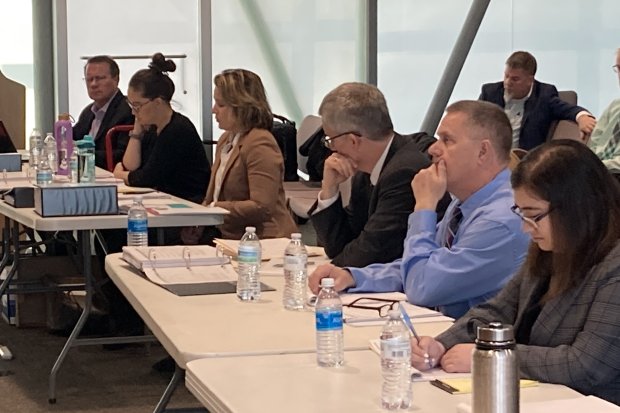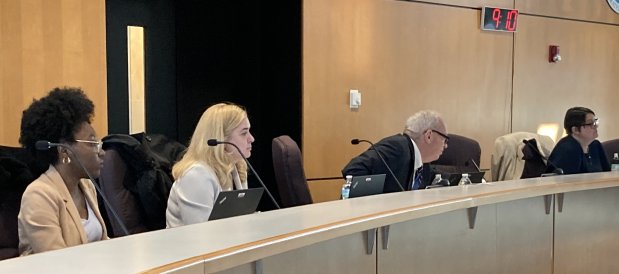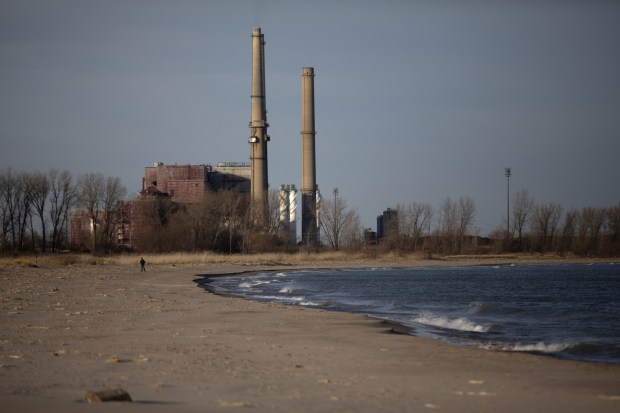As Midwest Generation seeks modification of its handling of coal ash at its decommissioned Waukegan power plant from the Illinois Pollution Control Board, it is reconsidering its earlier proposal to cap one coal ash pond and remove the other.
Local officials, including Waukegan Mayor Ann Taylor, have pushed Midwest to remove both ponds. State Sen. Adriane Johnson, D-Buffalo Grove, and state Rep. Rita Mayfield, D-Gurnee, introduced legislation in the Illinois General Assembly requiring removal.
With the Illinois Environmental Protection Agency (IEPA) setting specific rules for coal ash treatment, and the U.S. Environmental Protection Agency (EPA) proposing regulations of its own, Midwest is seeking clarity.
The future of the coal ash ponds at the NRG Waukegan Generating Station is a matter of disagreement between the city and the company. (Erin Hooley/Chicago Tribune)
Attorneys for Midwest Generation and the IEPA presented evidence at a hearing before the Illinois Pollution Control Board Tuesday at City Hall in Waukegan, where Midwest hopes to receive adjustments to the state’s current standards for coal ash treatment.
Hearing officer Brad Halloran said the purpose of the scheduled two-day hearing is to hear testimony from witnesses from both Midwest Generation and the IPEA — the IPEA opposes the request — as part of the decision-making process.
After the hearing is transcribed, Halloran said both Midwest Generation and the IEPA will file written briefs with the board before a final decision is made. Marie Tipsord, the board’s general counsel, said it may be several months before a decision is final.
Located along the shores of Lake Michigan, one of the coal ash ponds is adjacent to the lake, a second one is next to it and a 10-acre parcel described as the “grassy area” by witnesses lies to the west of the ponds.
Sharene Shealey, Midwest’s environmental director, said during her testimony the grassy area also may contain some coal ash residue.
Shealey said Tuesday’s hearing was about the treatment of the grassy area. She said complying with both the EPA and IEPA will be a challenge, which is one reason the company wants Waukegan treated differently.
“Complying with both would be a very complex and complicated task,” Shealey said on the witness stand. “The EPA’s rules are not final yet,” she added after she left the stand. “We’re still waiting for them.”
Before Midwest Generation finished presenting its case, the hearing panel heard comments from more than 20 members of the public including Taylor and environmental activists in a packed room of more than 100 people.

Taylor said the company has refused to cooperate with the city removing the pollution its coal furnaces have spewed for nearly a century. Waukegan already has five Superfund sites from other polluters in its industrial past, much of it along the lakefront.
“The residents of Waukegan cannot bear the financial cost of yet another environmental catastrophe caused by a private company,” Taylor said “This company is failing to address its environmental mess adequately. Waukegan residents deserve better.”
After her testimony, Shealey said in an interview, that though the company initially proposed over two years ago to cap the eastern coal ash pond and remove the one to the west, it was now looking at a different solution for the western one.

Johnson said in a text both ponds must be removed, both to protect the health of residents and help the environment. She plans to continue working with Mayfield and their colleagues to ensure all coal ash is removed from the site.
“We have to prioritize the health of residents in Waukegan and mitigate environmental hazards,” Johnson said. “That’s why it’s imperative to remove the coal ash as opposed to ‘capping in place.’ Waukegan deserves better.”





